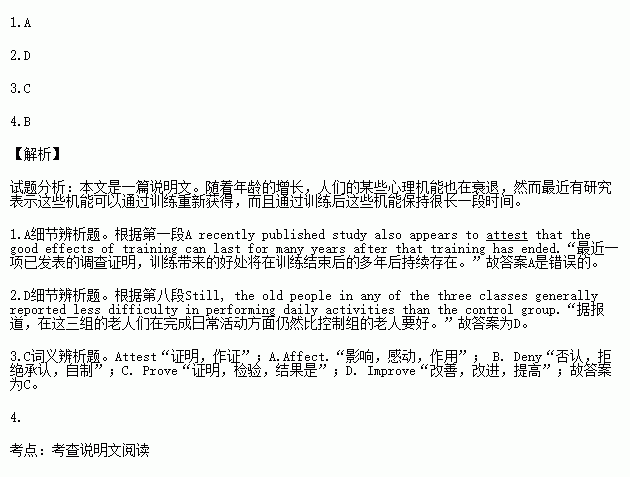题目内容
Some kinds of mental skills naturally decrease as people get older. Yet research seems to show that some training can improve such skills. A recently published study also appears to attest that the good effects of training can last for many years after that training has ended.
Researchers at Johns Hopkins University in Maryland wanted to learn how long memory and thinking skills would last in older people who were trained to keep them. The people were part of the ten-year research project. They were taught methods meant to improve their memory, thinking and ability to perform everyday tasks.
More than 2,800 volunteered for the study called ACTIVE — short for Advanced Cognitive Training for Independent and Vital Elderly. Most were studied when they were more than 70 years old.
The volunteers took one of several short training classes meant to help them keep their mental abilities. One class trained participants in skills including how to remember word lists. Another group trained in reasoning. A third group received help with speed-of-processing — speed of receiving and understanding information. A fourth group — the control group did not get any training.
Earlier results had established that the training helped the participants for up to five years. Now, leading study writer George Rebok says, the research showed most of the training remained effective a full ten years later.
Professor Rebok and his team found that the people trained in reasoning and speed-of- processing did better on tests than the control group.
“We are wondering whether those effects which endured over time would still be there ten years following the training, and in fact, that's exactly what we found.,,
The effect on memory, however, seemed not to last as long. Still, the old people in any of the three classes generally reported less difficulty in performing daily activities than the control group.The total training time for the older people was between 10 and 15 hours.
1. Which statement is false according to the text?
A. This kind of training can only have effects on people for a few years.
B. The people were trained during a period of ten years.
C. Most of the people who were studied were more than 70 years old.
D. The first group were trained how to remember word lists.
2. How would the old in the second group perform after receiving the trauung?
A. Remember more words.
B. Understand information more quickly.
C. Act as poorly as before.
D. Perform daily activities better.
3. What does the underlined word "attest" in the first paragraph mean7
A-Affect. B. Deny.
C. Prove. D. Improve.
4. Which of the following can be the best title for the passage?
A. Some Kinds of Mental Skills Naturally Decrease.
B. Mental Training Helped Elderly Stay Sharp for Years.
C. Four Groups of Old People Were Trained Mentally.
D. A Ten-year Research Affects Elderly.
 智趣寒假作业云南科技出版社系列答案
智趣寒假作业云南科技出版社系列答案
